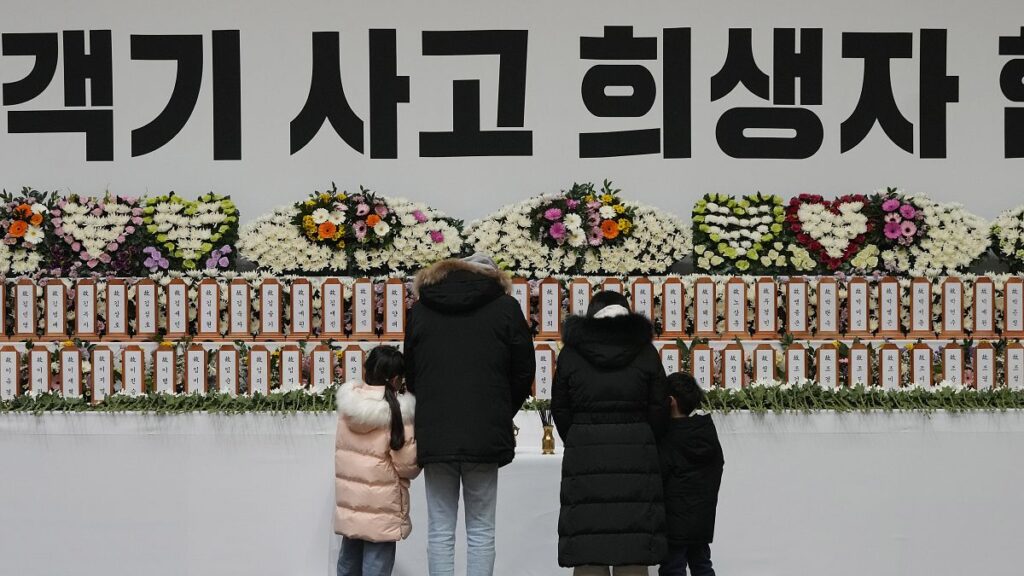The Jeju Air passenger plane crashed into a wall and burst into flames after leaving the runway at Muan Airport on Sunday, with its landing gear apparently failing to deploy.
Flowers have been laid at a memorial center set up in the southern South Korean city of Muan in memory of the 179 people killed in Sunday’s airliner crash at the airport.
The Jeju Air plane crashed into a wall and burst into flames after leaving the runway at Muan Airport, with its landing gear apparently failing to deploy.
The transport ministry said the plane was a Boeing 737-800 returning from Bangkok.
Yonhap news agency reported Monday that Seoul had ordered the inspection of all Boeing aircraft models in the country following the disaster.
At a briefing for families, authorities said the 141 victims from 1979 had been provisionally identified and all the bodies had been transferred to a temporary morgue.
At a press conference at Muan International Airport, officials from the Ministry of Land Planning, Infrastructure and Transport told reporters that the Jeju Air pilot contacted air traffic control to report that the The plane had suffered a collision with a bird and had sent out a distress call shortly before the crash.
Kang Jung-hyun said the control tower had already warned the plane of “avian activity” in the area.
“If she had more time, she could have requested preparedness measures, such as dispatching fire trucks and preparing for an emergency landing. Typically, in such cases, the pilot does these requests and the control tower coordinates them by placing fire crews on standby,” he added.
Footage of the accident broadcast by South Korean television channels shows the Jeju Air plane skidding at high speed on the runway, apparently with its landing gear still retracted, overshooting the runway and colliding with a concrete wall on the periphery of the facility, which triggered an explosion.
Other local television channels broadcast images showing thick plumes of black smoke escaping from the plane, which burst into flames.
Lee Jeong-hyeon, head of the Muan Fire Station, told a televised news briefing that the plane had been completely destroyed and only the tail of the plane was still recognizable among the debris. Lee said employees were investigating different possibilities as to the cause of the crash, including the possibility that the plane was struck by birds, Lee said.
Joo Jong-wan, a senior transport ministry official, said workers recovered flight data and cockpit voice recorders from the plane’s black box, which will be examined by government experts investigating on the causes of the accident and the fire.
Joo said the Muan airport runway would be closed until January 1.
The transport ministry said two Thai nationals were among the plane’s passengers. Thai Prime Minister Paetongtarn Shinawatra expressed his condolences to the families of the accident victims in a message on X.
Kerati Kijmanawat, director of Thailand’s airports, confirmed in a statement that Jeju Air flight 7C 2216 took off from Suvarnabhumi Airport without any anomalies being reported with the plane or runway.
In a statement, Jeju Air expressed its “deep apologies” for the accident and said it would do “everything possible to deal with the aftermath of the accident.”
In a televised news conference, Kim E-bae, chairman of Jeju Air, bowed deeply with other senior company officials to apologize to the bereaved families and said he felt “completely responsible” for the incident.
Mr. Kim said the company had not identified any mechanical problems on the plane following regular checks and would await the results of the government’s investigation into the causes of the incident.
Boeing said in a statement that it was in contact with Jeju Air and was ready to help the company deal with the accident.
“We extend our deepest condolences to the families who lost loved ones, and our thoughts are with the passengers and crew,” Boeing said.
It is the deadliest air disaster ever to occur on South Korean soil.
The last time the country experienced a large-scale aviation disaster was in 1997, when a Korean Airline plane crashed in Guam, killing 228 people on board.
In 2013, an Asiana Airlines plane crashed in San Francisco, killing three people and injuring around 200 people.


